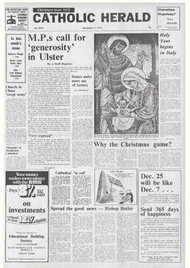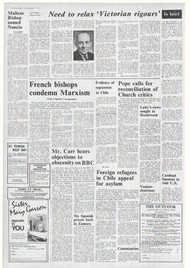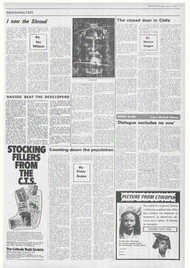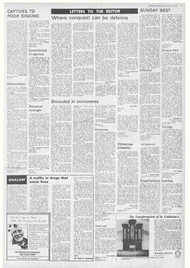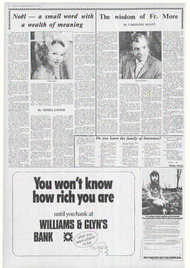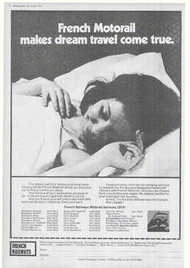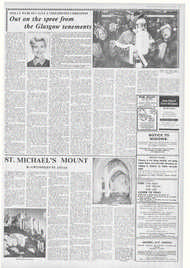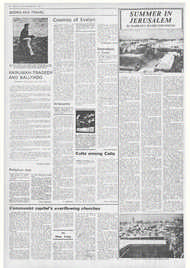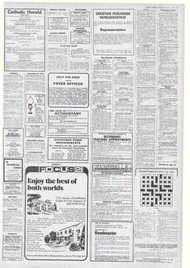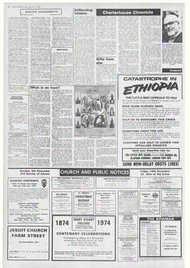Page 7, 7th December 1973
Page 7

Report an error
Noticed an error on this page?If you've noticed an error in this article please click here to report it.
Tags
Share
Related articles
How Green Is My Galway Valley
Compass Points From The Capital
Every Town And Every Village Has Its Story And Its Secrets
The Age-old Lure Of A Magical Isle
Lamb Chops, Wild Salmon And Soaring Cliffs Of Erin
An international Irish actress
Barbara Mullen has two havens of peace in Ireland one off the wild and rugged West Coast facing the Atlantic, and the other on the East Coast facing out over the Irish Sea.
The home in the West is in the Aran Islands, a small group of three islands about 30 miles out from Galway harbour. This was the home of Barbara Mullen's father before he went to the United States.
The people in the Aran Islands are Gaelic speakers, So, though Barbara Mullen was born in America her first words were spoken in the Gaelic totigue. Even then her second language was not English but Chinese the Mullen family were at the time living over a Chinese laundry.
Barbara likes to get out to the Aran Islands whenever she can, but the time it takes to get there 'from London is a deterrent that only the most dedicated could afford to ignore it takes nine hours of continuous travel.
Her second Irish home is a little closer to her work but still not exactly within convenient commuting distance. It is in the County Dublin hamlet of Dalkey.
When I met Barbara Mullen some weeks ago she told me that they were giving up the Dalkey home and moving to London, where she would be nearer her work. But she said that she would continue to visit Ireland as often as she could.
The day I went to meet Barbara I wondered to myself if the real-life Barbara Mullen bore any relation to Barbara Mullen the actress as I had known her from "Doctor Findlay's Casebook." I wondered if the simple wisdom of the Doctor's housekeeper was the product of scriptwriters or if it was a part tof the real person.
I wondered if the slight Scottish accent was part of the actress or her natural way of
speaking. When I met the real Barbara Mullen I found her in many ways to be exactly as she is portrayed in "Dr. Findlay."
She was everything you would have expected her to.be -neat, kind, gentle, impeccably dressed and curiously enough a slight trace of the same Scottish accent that is so familiar to viewers of "Dr. Findlay."
Though Barbara Mullen was born in America she considers herself Irish. She was educated in the United States but does not believe that education ends when one leaves school. She likes to think that her education is an on-going process and that every day she continues to learn.
While she considers herself Irish and her home is in Ireland, Barbara spends most of her time outside Ireland. Her own work and the work of her husband gives them very little time to be together in Ireland. Mr. Taylor (Barbara's husband) is a documentary film maker whose work brings him to all corners of the globe.
They seldom have time off that coincides. This is partly why they decided to give up the Dalkey house and move to London.
A Catholic by birth and education, Barbara does not like to put too much importance on denominational categories. For her the most important thing is not what religion you are but that one believes in and has a sincere love of God. Race or creed are not important to her; she likes to help people no matter what their background.
Lessons she learned as a young girl in New York still form part of the guidelines for her own code of ethics. She remembers living in one of the roughest, toughest, and poorest parts of New York during the depression years.
• In the neighbourhood there was a hospital for the blind where many of the young men who had been blinded during the war were patients. These men were of all nationalities and all faiths. Most of them had grown very bitter since losing their sight, and attempts by nurses, doctors and chaplains had failed to lift the men out of the severe depression into which most of them had fallen.
Children from the surrounding houses would visit the hospitals in the hope that they might get some of the food that the men would not eat, and it was the children who first managed to draw these bitter and introverted men out of themselves.
It did not matter to the children what nationality, what colour, or what creed the men were; they made friends with the men and the men responded to their friendship. Words like denomination and race had no meaning for the children, and consequently they were successful where others had failed.
Barbara Mullen's career started out in dancing, and she still has a great love for dance. She would have liked her own children to take up dancing, but they did not. From dancing she moved on to acting. Her acting career began in earnest in England, and since then she has acted in places as far apart as America and Hongkong.
Though the series "Dr. Findlay's Casebook" is off the screens at the moment she thinks it may be revived, because there is still a terrific amount of interest in the series. People from all walks of life loved the progamme and since it has been taken off there has been pressure from doctors, teachers, clergy and parents to have it brought back again.
She believes the programme had a tremendous educative and social value; that it made people aware of the advances made in medicine in the last 20 years.
It made us realise the improvement in our lot. that a quarter of a century ago sicknesses like tuberculosis, diptheria, polio and pneumonia were frequently terminal sicknesses. The programme made us aware of the immense progress that had been made and was a way of showing us the blessings we have. Her role as the doctor's housekeeper in "Dr. Finday" was one that Barbara never found boring. The characters (based on the characters of A. J. Cronin) were so real that boredom did not have an opportunity to set in. And of course her love of acting means that she could hardly find any dramatic work boring.
Television she finds particularly fascinating as a medium to work in. She says the frequent advances in technology made television a particularly challenging and interesting arena to work in.
Barbara Mullen is an avid reader, and whenever she travels she likes to have a book with her at all times. A favourite book she does not have, but she does see the Bible as one of the greatest collections of morally uplifting and educative stories ever drawn together.
Her views on the "permissive society" are not what one would expect from a dainty doctor's housekeeper. She does not see the "permissive society" as a retrograde sten: she sees it as a more honest society than its predecessor.
She recalls her early days at work when class factors were very important; today she says, the elemenisof class distinction no longer have the same importance. She feels that the changes that have taken place are bringing us 'closer to a classless society.
"People are more honest and open in their dealings with one another. Young people today are more concerned than they have ever been before. They are willing to set aside a great deal of their time to help the aged and the needy. Class is no longer the criterion for the worth of a person brains, talent and courage are the yardstick that a person is measured by today."
She admires the way the young are prepared to take a stand on issues that they believe in the way they face beatings and harassment for their beliefs.
Barbara Mullen herself is a very selective television viewer; she watches only what she really wants to see. She does not have any particular programme that she would watch consistently but has a slight interest in "Cannon." She likes Cannon because he is so much an anti-hero/hero.
Irish television, she feels, has neglected Irish talent, and sees prospects for an Irish export industry in television if it were used properly. "We have the material for good TV programmes, we have the artists to perform them and we have the technical staff but somewhere along the line we fall down."
As an Irishwoman who earns most of her living in England, Barbara Mullen finds that the conflict in Northern Ireland in terferes very little with her work. or with her relationships with her work colleagues. But she does find the situation "acutely distressing," and finds it difficult to understand why the bitterness and conflict must go on.
In any of the dealings that she has had with people from the North of Ireland she has always found then very pleasant. She has never experienced "any difficulty working with them" and has always found them very "tolerant and talented."
When I spoke to Barbara Mullen she was leaving Ireland she was busy completing a radio version of "Dr. Findlay" and was also working on a collection of short stories. The stories were, she said, to be semi-autobiographical; the only difficulty about them was that she was not sure whether to call them fiction or fact.
She was afraid that if she said that they were factual that: readers would say that they were too fantastic to be factuaL But then Barbara Mullen's life has, so far at least, been closer to the fantastic than to the ordinary mundane lives led by most people.
blog comments powered by Disqus


